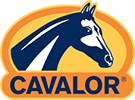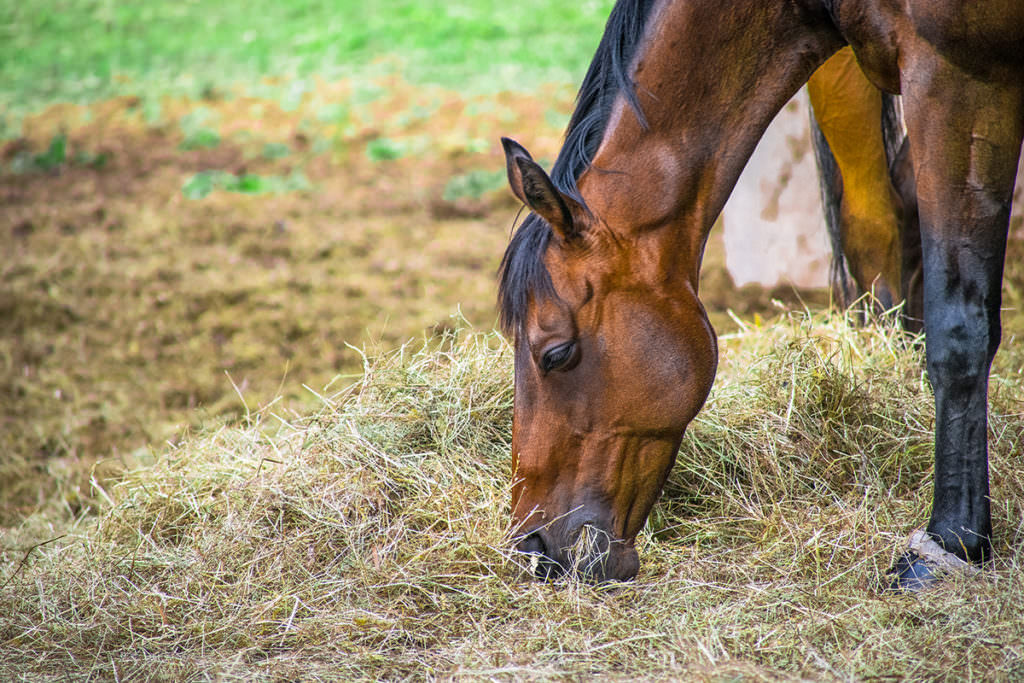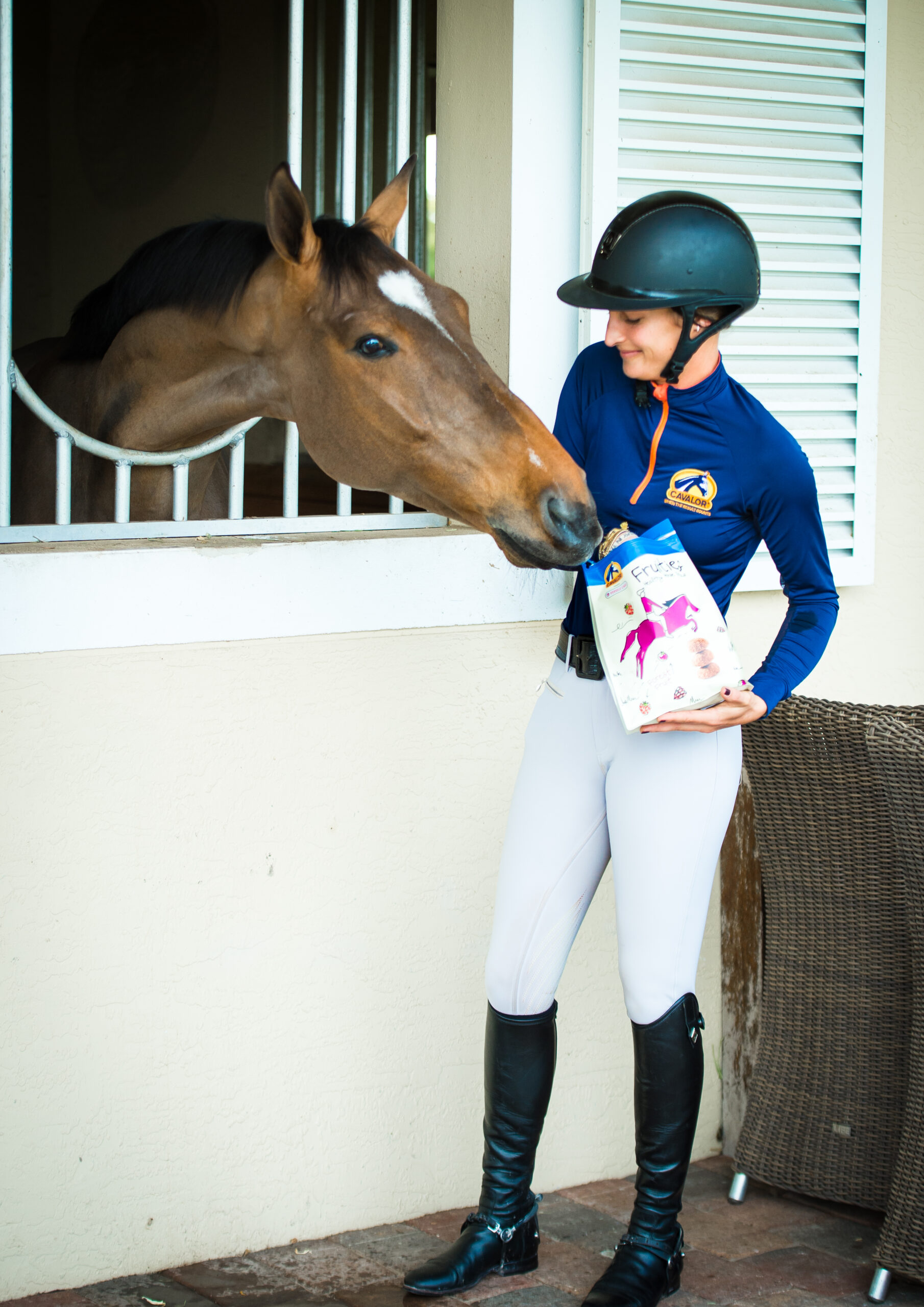We all want our horses to be healthy. What makes a healthy horse and why is it important? That mostly comes from within. One of the most important foundations for good health is a well-functioning gastrointestinal tract. It’s not only responsible for digestion, but also important for a horse’s immune system. And a strong immune system is the key to a horse’s physical health. In this Science Sunday article we’ll tell you all about the leading role fiber plays in your horse’s health.
Horses are herd animals by nature that once lived on the Eurasian Steppe. They are creatures of habit that must always have the opportunity to flee. Horses are also herbivores that are accustomed to movement through grazing. Originally, they would graze day and night, spending as much as 16 hours a day nibbling on grasses and herbs that are low in what we have traditionally considered to be important nutrients. However, as science advances we are becoming more aware of the importance of fiber and other micronutrients to the microbiome and optimal functioning of the horse as an organism. For the gastrointestinal tract to work properly, a horse must eat sufficient amounts of fiber every day.
Dietary fibre
When we talk about fiber, we mean dietary fiber. Dietary fiber consists of carbohydrates that are fermented by bacteria. A horse needs fiber not only for energy, but also for healthy bowel movements and a strong immune system. fiber is actually an essential “multi-tool” in the horse’s body, ensuring a well-functioning gastrointestinal tract which in turn ensures proper absorption of nutrients and good immunity. Forage has a high proportion of fiber that a horse can easily digest. A horse’s daily supply of forage provides its basic fiber requirements. Concentrates may also contain fiber. For example, Cavalor FiberForce is a high-fiber feed.
Different kinds of fibre
Fiber sources may vary, but generally it all comes from plants: grass, but also alfalfa, beet pulp, wheat, spelt and even (to a lesser degree) in concentrates. In short, you can divide fiber into two types: fermentable and non-fermentable fiber. Fermentable fiber is broken down by bacteria in the caecum and large intestine. It is then converted into compounds called volatile fatty acids (VFAs) that provide energy for the horse’s body.
Non-fermentable fiber does not provide energy but has another important function. It provides intestinal content that stimulates kneading of the intestinal wall. This process moves feed along through the bowel. The speed of passage is also important, as the right speed allows the contents to mix well and ensures longer contact of the partly digested food and digestive fluids (chyme) with the intestinal wall, promoting nutrient absorption.
In this video, you’ll learn all about a horse’s digestive system:
The importance of prebiotics
The gut microbiome is something you often encounter in relation to fibre. Many microorganisms, such as bacteria, viruses and yeasts, live in and on the body. Collectively, these are called the microbiome. A predominance of good microorganisms means that the gut microbiome has a positive influence on the horse’s health. High-fibre feeds support the development of a stable and healthy microbiome. Prebiotics feed “good” bacteria and fibre is a natural prebiotic.
Do horses get enough fibre on average?
Horses get most of the fiber they need from forage. You could say that if the horse eats enough forage, the horse is getting enough fiber. In principle, a horse can never consume too much fiber.
Fibre quality
It is difficult to make a 100% accurate estimate of a horse’s fiber intake. You can learn a lot about it, though, from a horse’s manure droppings. They should be nice and round, not watery, stalky, or dry. A very coarse texture can tell you something about the horse’s teeth as well as the health of its intestinal flora. A disrupted gut microbiome cannot digest fiber adequately. Pre- and/or probiotics can help. Colic and diarrhea are also often related to fiber intake. The solution is a ration with adequate fiber. The quantity of fiber cannot be determined with the naked eye; fortunately, a comprehensive analysis offers a solution. You can use this to determine the digestibility of the crude cellulose and the quality of the fiber. In general, forage analyses are only useful if you feed hay or haylage from a large batch from the same origin.
An analysis provides insight into the quality of the raw cellulose
The longer the fibers (>2 centimeters), the longer the horse has to chew, and the more saliva is produced. This is good for neutralizing stomach acid. Long fibers also stimulate intestinal motility which ensures proper digestion and less chance of colic. Saliva isn’t the only benefit of long chewing. It also causes the teeth to wear down and helps the feed to be absorbed more slowly. Slow digestion is optimal as it increases absorption of via the intestinal lining and slows the rate of increase of blood sugar levels, decreasing stress levels.
Fibre first and foremost
Horses are herbivores. The equine digestive system is designed for this from beginning to end. Horses need lots of forage. The dry matter percentage can then be used to calculate the amount of forage needed. The more fiber in the feed, the longer the horse must chew it, and longer chewing will produce more saliva. That’s healthy for the horse. The micro-organisms in the gut also need roughage. Adequate fiber is essential to maintaining healthy microflora. A healthy intestinal system ensures a healthy immune system, the foundation for equine health.
Tips from the specialist
fiber is important for overall health. A horse will get most of the fiber it needs from forage, but you can supplement the feed ration with concentrates to provide extra support. Concentrates with fiber are an ideal addition to the ration.
Veterinary surgeon Erica Reijerkerk knows all about internal equine health. She has some tips:
- Always feed adequate fiber through forage and concentrates. The teeth are the first step in the digestive process. Have your horse’s teeth checked annually
- Feed as you need – Match the ration to your horse’s level of physical activity
- Do daily visual health checks to get a good overview of the horse’s health and condition
Fibre-rich feed from Cavalor for a healthy horse inside and out
Cavalor FiberForce contains a high amount of Fiber Plus crude fiber, which is derived from high quality fiber sources such as lucerne stalks, spelt, and linseed fibers. These fibers are the engine of every horse’s gut. This long-fiber mix is low in sugar (5%) and starch (3%). to maintain low blood glucose and insulin levels. This also makes Cavalor FiberForce well-suited for horses prone to metabolic disorders.
Cavalor FiberForce Gastro is a high-fiber mix for healthy stomach function. It contains a high proportion of fiber consisting of a blend of lucerne and teff grains, beet pulp, and 8% timothy stems, ideal for stimulating saliva production and neutralizing stomach acid. This combination of herbs protects the stomach lining against irritation and helps to maintain a neutral pH value in the stomach.
Cavalor OilMega helps keep your horse healthy. OilMega contains omega-3, 6, and 9 fatty acids combined with natural antibiotics for healthy gut flora and extra support for the immune system. It gives your horse a shiny coat, healthy gut flora, and stronger natural defenses.
.


